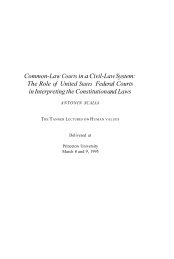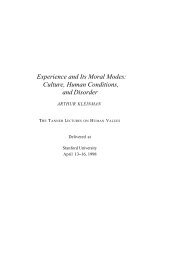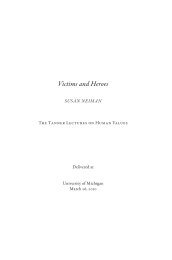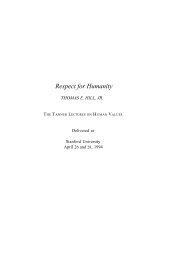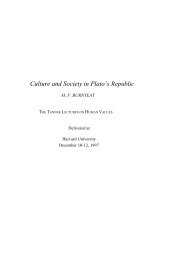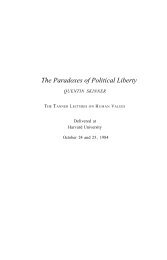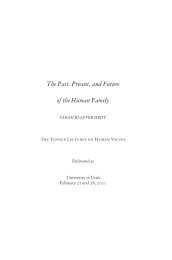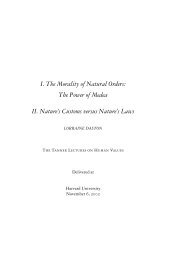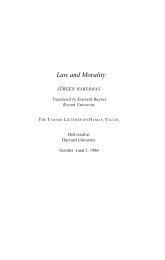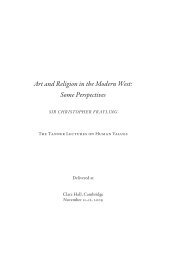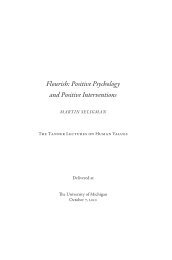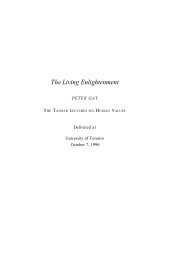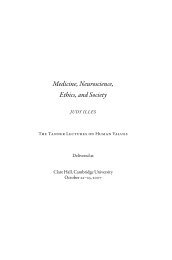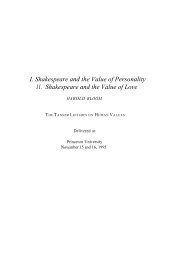Muguerza, Javier - The Tanner Lectures on Human Values
Muguerza, Javier - The Tanner Lectures on Human Values
Muguerza, Javier - The Tanner Lectures on Human Values
You also want an ePaper? Increase the reach of your titles
YUMPU automatically turns print PDFs into web optimized ePapers that Google loves.
118 <str<strong>on</strong>g>The</str<strong>on</strong>g> <str<strong>on</strong>g>Tanner</str<strong>on</strong>g> <str<strong>on</strong>g>Lectures</str<strong>on</strong>g> <strong>on</strong> <strong>Human</strong> <strong>Values</strong>physical” (1985), where - in explaining the ultimate sense ofhis “theory of justice” - Rawls specifies, in passing, the ultimate,or near ultimate, sense of his own individualism. 91 With agreat deal more clarity than in the essay by Habermas that I quotedfrom earlier, Rawls begins by pointing out that his proceduralc<strong>on</strong>structi<strong>on</strong> refers <strong>on</strong>ly to our present democratic societies and inthis light we are to interpret the c<strong>on</strong>diti<strong>on</strong> of the c<strong>on</strong>tractualpartners (that is, “free and equal subjects”) in his mental experimentc<strong>on</strong>cerning the original positi<strong>on</strong>. (With or without the “veilof ignorance,” they are the citizens whom we daily meet and whotake part in our day-to-day political life, in additi<strong>on</strong>, of course, topers<strong>on</strong>ifying the “liberal political doctrine.”) 92 And this is whyRawls’s c<strong>on</strong>cepti<strong>on</strong> of the individual or the pers<strong>on</strong> needs no morethan the overlapping c<strong>on</strong>sensus 93which, in a society that is pluralisticas to religious beliefs and ideology in general, allows thecitizens to agree <strong>on</strong> certain “basic principles of justice.” Moreoverhe is saved from having to c<strong>on</strong>template - as Rawls himselfexplicitly admits - any “str<strong>on</strong>ger” c<strong>on</strong>cepti<strong>on</strong>s of the “subject,”such as the Kantian <strong>on</strong>e. 94As Rawls himself acknowledges, “when [in his theory ofjustice] we simulate being in the original positi<strong>on</strong>, our reas<strong>on</strong>ingno more commits us to a metaphysical doctrine about the nature ofthe self than our playing a game like M<strong>on</strong>opoly commits us tothink that we are landlords engaged in a desperate rivalry, winnertake all.” 95We may be, then, the same in real life as in the originalRawlsian positi<strong>on</strong>, just as Saul of Tarsus remained in some sense91 J. Rawls, “Justice as Fairness: Political Not Metaphysical,” Philosophy andPublic Affairs 14 (1985) : 223-51.italics.]92 Rawls, “Justice as Fairness,” 231ff.93 [<str<strong>on</strong>g>The</str<strong>on</strong>g> words “overlapping c<strong>on</strong>sensus” were in English in the original; J.M.’s94 Ibid., 245ff.95 Ibid., 239.



